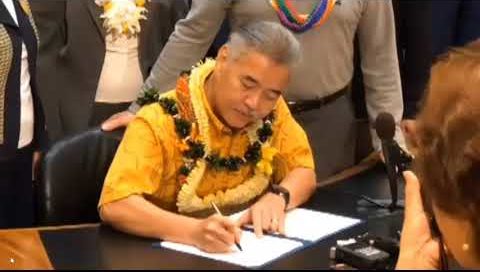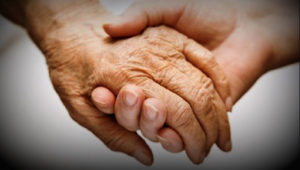Hawaii just became became the seventh state in the nation to allow medical aid in dying, joining Oregon, California, Colorado, Vermont, Washington and the District of Columbia in enacting legislation that allows physicians to help terminally ill individuals die. (Montana also allows medical aid in dying, but the decision was made by judicial decree.) Marking the end of a long battle for patient autonomy in the state, the Hawaii state senate voted 23-2 on March 29 to approve the “Our Care, Our Choice Act.” Gov. David Ige signed the bill into law on April 5, 2018. It will go into effect Jan. 1, 2019.

Gov. Ige signs medical aid in dying bill
Credit: Thaddeus Mason Pope, JD, PhD/YouTube
“This legislation has been written to ensure that the patient is in full control,” Gov. Ige said after signing the bill. “When I think about this law it is impossible not to think of friends and family who have struggled through a difficult prognosis…We know that our loved ones will eventually die but they don’t need to suffer,” he added.
Like most “death with dignity” legislation in the United States, the Hawaii statute is modeled after the law in Oregon, which has been in effect since 1997. It contains a number of safeguards to ensure that only mentally competent, terminally ill individuals have access to a physician’s prescription for life-ending drugs. These include:
Certification by two health care professionals that the patient has a terminal diagnosis, has less than six months to live, and is mentally competent to make the decision to end his own life.
Two verbal requests from the patient, made not less than 20 days apart.
A signed, written request from the patient witnessed by two people. One of the two witnesses must be unrelated to the patient.
Mandatory counseling by a mental health professional (psychiatrist, psychologist or clinical social worker), who attests that the patient is capable of giving informed consent and is not suffering from depression or any other mental health condition that would interfere with their ability to make an informed decision.
The patient can rescind their request at any time.
Additionally, the patient must be able to self-administer the prescribed medication. Physicians are barred from assisting in any way.

Credit: U.S. Air Force photo by Kat Bailey
Unsurprisingly, the passage of the bill met with opposition from a number of groups. On April 4, a petition with over 18,000 signatures was presented to the governor to try to dissuade him from signing the bill, according to news station khon2. Eva Andrade of the Hawaii Family Forum told the station, “Whether it’s elderly kupuna or youth, suicide is not what the people of Hawaii really want.”
The law also came under fire from Americans United for Life, a national pro-life group based in Arlington, Virginia. In a statement to The Daily Caller News Foundation, AUL president Catherine Glenn Foster said, “America’s most vulnerable citizens, including the elderly, the terminally ill, the disabled, and the depressed, are worthy of life and equal protection under the law.”
Opponent statements notwithstanding, polls show that the people of Hawaii have been firmly in favor of medical aid in dying for some time. According to the advocacy group Compassion & Choices, a 2016 poll by Anthology Research Group showed that 80 percent of Hawaii residents supported medical aid in dying at that time. And a 2018 poll commissioned by the Honolulu Star Advertiser showed that 71 percent of Hawaii voters support the practice, while only 19 percent are opposed.

 Hawaii Passes Medical Aid in Dying Law
Hawaii Passes Medical Aid in Dying Law


 How Dare You Die Now!
How Dare You Die Now!

 “Help Me, Helen”
“Help Me, Helen”














